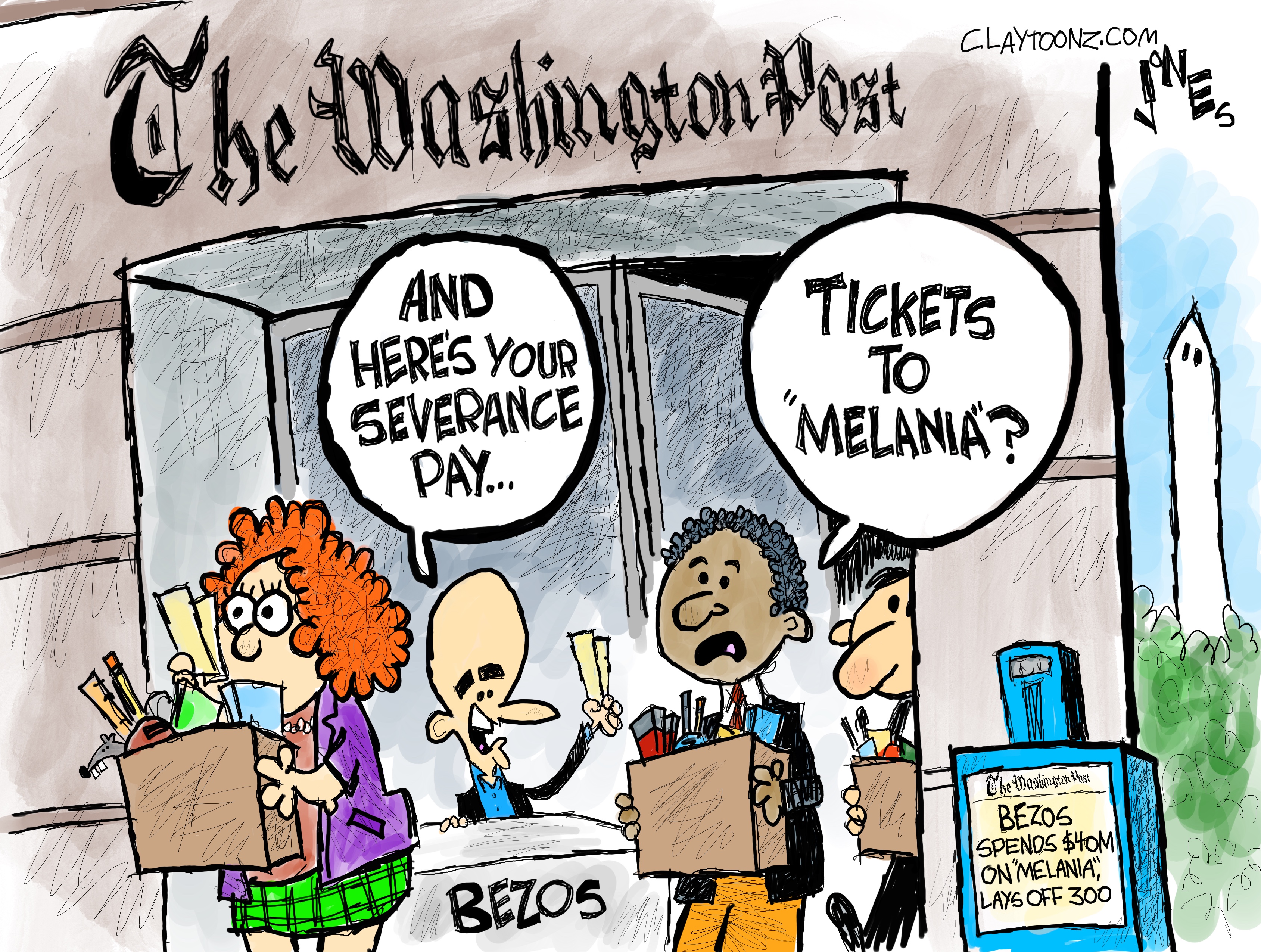Is getting on President Trump's bad side actually good for business?
Maybe corporations don't have to fear Trump's wrath after all


A free daily email with the biggest news stories of the day – and the best features from TheWeek.com
You are now subscribed
Your newsletter sign-up was successful
Corporate CEOs are said to live in fear of President Trump's Twitter account. Woe unto those whose decision to outsource jobs or automate a factory should draw that 140-character Eye of Sauron. Companies like Boeing, Lockheed Martin, and Toyota have been the target of a Trump tweet and seen a quick drop in their stock prices.
But maybe Trump's ability to punish corporations that grow wicked in his sight is overblown. Maybe they don't actually have much to fear from him. Maybe they can even stand up to him, and come out perfectly fine.
That certainly seems to be the case with Nordstrom, the department store that made the fateful decision to stop carrying Ivanka Trump's clothing line — not for any political reason, they said, simply because sales were weak. Once their move became public, the administration swung into action. On Wednesday, the president tweeted, "My daughter Ivanka has been treated so unfairly by @Nordstrom. She is a great person — always pushing me to do the right thing! Terrible!" Then Kellyanne Conway went on Fox & Friends the next morning to do her part. "It's a wonderful line. I own some of it," she told the viewers. "I'm going to give a free commercial here. Go buy it today, everybody." Sure, endorsing products like that is a violation of government ethics rules, but they're shaking up the old Washington system!
The Week
Escape your echo chamber. Get the facts behind the news, plus analysis from multiple perspectives.

Sign up for The Week's Free Newsletters
From our morning news briefing to a weekly Good News Newsletter, get the best of The Week delivered directly to your inbox.
From our morning news briefing to a weekly Good News Newsletter, get the best of The Week delivered directly to your inbox.
Then the inimitable Sean Spicer brought his special brand of indignation to poor suffering Ivanka's cause. "This is a direct attack on his policies and her name," he said. "She is being maligned because they have a problem with his policies." The only appropriate thing to do, it would seem, is to stock those clothes in your store whether anyone's buying them or not. Spicer may have been right, just not for the reason he thought: Sales of Ivanka-wear may well have declined because of her father's repellent run for president, even if Nordstrom was just making a pure business decision.
Either way, Nordstrom is suffering the terrible consequences, right? Well...not exactly.
Nordstrom's stock price actually rose immediately after Trump's tweet, and so far seems to be suffering no ill effects. And while there are probably some die-hard Ivanka fans out there who will refuse to cross the threshold of a Nordstrom ever again, there are also probably an equal number of liberals who will patronize the store more often now, for the same reason. Action, reaction.
Consumer choices have been getting more and more politically charged in recent years, a trend that will only intensify in Trump's America. You probably haven't forgotten how Chick-fil-A incurred the wrath of liberals, and efforts to shut it out of major cities, when the ultra-conservative social views of its owners became widely known. So what happened? Visiting a Chick-fil-A became a handy way for Republican politicians to signal cultural affiliation with religious right voters, and plenty of conservative voters became even more bonded with the company, which continues to grow.
A free daily email with the biggest news stories of the day – and the best features from TheWeek.com
That's just one case, and of course there are plenty of examples of successful boycotts. The most effective ones, however, are usually those that have a particular thing they're asking the company to do (or stop doing). Lately liberals have been pressuring companies to stop advertising on Breitbart, the white nationalist website that used to be run by Stephen Bannon, Trump's senior adviser — with considerable success. That's an easy step for a company to take to rid itself of a headache; it's much harder for a boycott to get consumers to abandon a brand for good.
Just look at what happened around the Super Bowl. A number of the ads contained subtle or not-so-subtle digs at the president's policies, including one that portrayed a mother and daughter's journey north to America (from a lumber company) and another for Budweiser that told the immigrant story of the founder of parent company Anheuser-Busch. After it was unveiled, some conservatives tried to organize a Bud boycott, which went precisely nowhere, just as previous similar efforts had. Remember when religious right activists vowed to bring Starbucks to its knees because their Christmas cups were just red, without an appropriately Christmas-y image, like perhaps Jesus on the cross? Starbucks, too, is still standing — and it recently announced, in response to Trump's refugee ban, that it would hire 10,000 refugees over the next five years.
I'm pretty sure that when a huge company like Anheuser-Busch considers airing a potentially controversial ad at the Super Bowl, they do some very careful thinking — and polling and focus-grouping — before going ahead. Which tells us that an implied dig at a president elected with a minority of the vote isn't necessarily such a risky move. And if Trump were to hit back, would it make any difference in the long term? Probably not.
To be clear, I don't mean to suggest that it isn't spectacularly inappropriate for the president of the United States to single out an American company for scorn based on little more than something he saw on Morning Joe. But these days, being on Donald Trump's bad side may not necessarily be bad for business.
Paul Waldman is a senior writer with The American Prospect magazine and a blogger for The Washington Post. His writing has appeared in dozens of newspapers, magazines, and web sites, and he is the author or co-author of four books on media and politics.
-
 Political cartoons for February 6
Political cartoons for February 6Cartoons Friday’s political cartoons include Washington Post layoffs, no surprises, and more
-
 Trump links funding to name on Penn Station
Trump links funding to name on Penn StationSpeed Read Trump “can restart the funding with a snap of his fingers,” a Schumer insider said
-
 US, Russia restart military dialogue as treaty ends
US, Russia restart military dialogue as treaty endsSpeed Read New START was the last remaining nuclear arms treaty between the countries
-
 The billionaires’ wealth tax: a catastrophe for California?
The billionaires’ wealth tax: a catastrophe for California?Talking Point Peter Thiel and Larry Page preparing to change state residency
-
 Bari Weiss’ ‘60 Minutes’ scandal is about more than one report
Bari Weiss’ ‘60 Minutes’ scandal is about more than one reportIN THE SPOTLIGHT By blocking an approved segment on a controversial prison holding US deportees in El Salvador, the editor-in-chief of CBS News has become the main story
-
 Has Zohran Mamdani shown the Democrats how to win again?
Has Zohran Mamdani shown the Democrats how to win again?Today’s Big Question New York City mayoral election touted as victory for left-wing populists but moderate centrist wins elsewhere present more complex path for Democratic Party
-
 Millions turn out for anti-Trump ‘No Kings’ rallies
Millions turn out for anti-Trump ‘No Kings’ ralliesSpeed Read An estimated 7 million people participated, 2 million more than at the first ‘No Kings’ protest in June
-
 Ghislaine Maxwell: angling for a Trump pardon
Ghislaine Maxwell: angling for a Trump pardonTalking Point Convicted sex trafficker's testimony could shed new light on president's links to Jeffrey Epstein
-
 The last words and final moments of 40 presidents
The last words and final moments of 40 presidentsThe Explainer Some are eloquent quotes worthy of the holders of the highest office in the nation, and others... aren't
-
 The JFK files: the truth at last?
The JFK files: the truth at last?In The Spotlight More than 64,000 previously classified documents relating the 1963 assassination of John F. Kennedy have been released by the Trump administration
-
 'Seriously, not literally': how should the world take Donald Trump?
'Seriously, not literally': how should the world take Donald Trump?Today's big question White House rhetoric and reality look likely to become increasingly blurred
